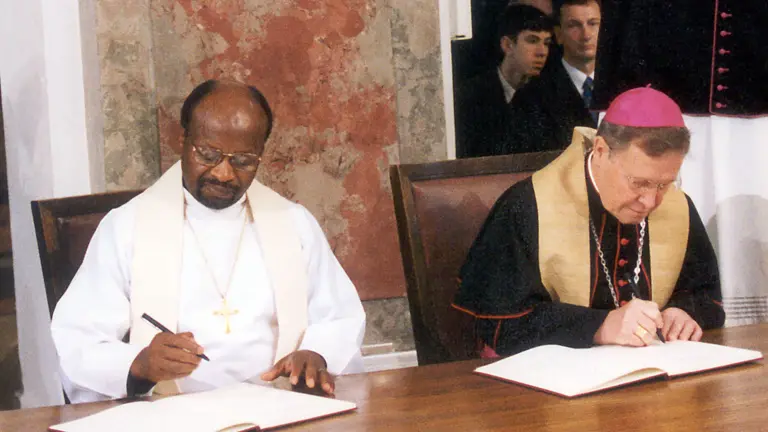Many Catholics believe the Reformation is over. After all, the Lutheran World Federation signed an accord with the Vatican stating that they have found agreement on the central article contested during the the Reformation, namely, justification by faith.
The National Catholic Register has an article on the subject by Fr. Raymond de Souza entitled Did the Reformation End in 1999?
Twenty-five years ago, on October 31, 1999, Reformation Day, the Joint Declaration on the Doctrine of Justification was published, a 27-page document, which gave this summary of the agreement between the Catholics and the Lutherans:
“In faith we together hold the conviction that justification is the work of the triune God. The Father sent his Son into the world to save sinners. The foundation and presupposition of justification is the incarnation, death, and resurrection of Christ. Justification thus means that Christ himself is our righteousness, in which we share through the Holy Spirit in accord with the will of the Father. Together we confess: By grace alone, in faith in Christ’s saving work and not because of any merit on our part, we are accepted by God and receive the Holy Spirit, who renews our hearts while equipping and calling us to good works.”
Six months earlier, as the negotiations were going on, a similar agreement was announced by the organization Evangelicals and Catholics Together, spearheaded by evangelical activist Charles Colson and LCMS pastor turned Catholic priest Richard John Neuhaus, entitled The Gift of Salvation.
Other church bodies began signing onto the Joint Declaration. By 2017, the World Methodist Council, the Anglican Consultative Council, and the World Communion of Reformed Churches had all stated that they were in agreement with Rome on justification.
So if the Lutherans, the Reformed, the Anglicans, the Methodists, and the Evangelicals now agreed with Rome on the doctrine of justification by faith, the dividing issue in the Reformation, then the Reformation must be over. Right?
In the words of another Catholic, Peter Wolfgang, writing on the subject and citing a Catholic and a Protestant scholar, respectively,
When it comes to Evangelical Protestants, I’m a lover, not a fighter. And what I want to say to my Evangelical friends, whom I love, is this.
The Reformation is over. Come home. . . .
For my part, I hope Evangelicals celebrate this upcoming Reformation Day by declaring, with Peter Kreeft and George Marsden, that the Reformation is over. And that they are coming home to the Catholic Church.
Well, what about that? It would indeed be an impressive message to the secular culture if Protestants and Catholics would re-unite. That statement above is pretty good, isn’t it? For Catholics to accept that, they must have made important concessions to the Protestant side. Right?
I hate to spoil the party, but an agreement with mainline liberal Protestants, whose ecumenical priorities have enabled them to find agreement with just about everybody, does not carry the weight that Catholics assume. The way the Protestant ecumenical movement has for many years proceeded has been to formulate a common language, even though both sides interpret it differently, and to call that an agreement.
It is one thing for both sides to speak of “justification,” “grace,” and “faith.” But when each side means something different by those terms, there is no actual agreement.
Confessional Lutherans, as opposed to the liberal Lutherans who make up most of the Lutheran World Federation, critiqued the Joint Declaration. In the LCMS, the Commission on Theology and Church Relations (CTCR) and the faculty of both seminaries issued another report entitled The Joint Declaration on the Doctrine of Justification in Confessional Lutheran Perspective. It looks at the agreement closely and details the problems with it. For example,
4. JDDJ does not settle the major disagreement between Lutheran theology and Roman Catholic theology on justification. Lutherans teach that justification is essentially a declaration of “not guilty” and “righteous” pronounced by God on a sinner because of Christ and His work. Roman Catholics teach that justification involves an internal process in which a believer is transformed and “made” more and more righteous. The non-settlement of this issue forms the chief defect of JDDJ.
5. Correspondingly, JDDJ fails to define clearly the word grace. Content to use the term “justification by grace,” the document does not resolve the classic question whether such grace is God’s undeserved favor (Lutheran) or whether it is a spiritual power poured or “infused” into the soul that enables one to love God and merit salvation (Roman Catholic). Rome’s view of grace as infused stands at the base of its theology of justification as a process.
Another difference that the CTCR document gets into is that Lutherans believe that we are “justified by faith alone” (Galatians 2:16). Catholics still believe that we are justified by faith plus our works, not in the James 2 sense in which living faith bears fruit in good works, but in the sense that faith gives us a power to do works that merit salvation.
The Reformation was about all of the solas. When it comes to our salvation, says the confessional response, “justification occurs through Christ alone (solo Christo), by grace alone (sola gratia), and in faith alone (sola fide).” And when it comes to authority in the church, scripture alone (sola Scriptura), not the Scriptures plus the papacy.
I would love to see our churches achieve a genuine unity. A good place to start would be with the Augsburg Confession, which lays out the many things that the Reformers do agree with the Catholics on, plus succinctly states the points of disagreements. I actually believe that Catholics would find that Confession more palatable than most of today’s mainline liberal Protestants would.
Photo: The Rev. Dr Ishmael Noko and Bishop Dr Walter Kasper signing the Joint Declaration on the Doctrine of Justification (JDDJ) by K. Wieckhorst, Lutheran World Federation












